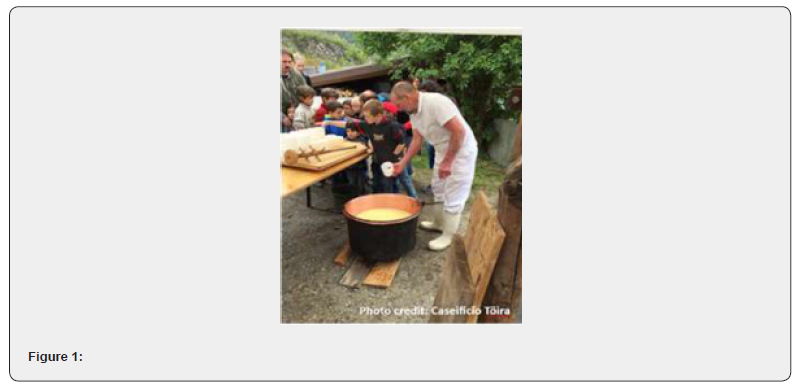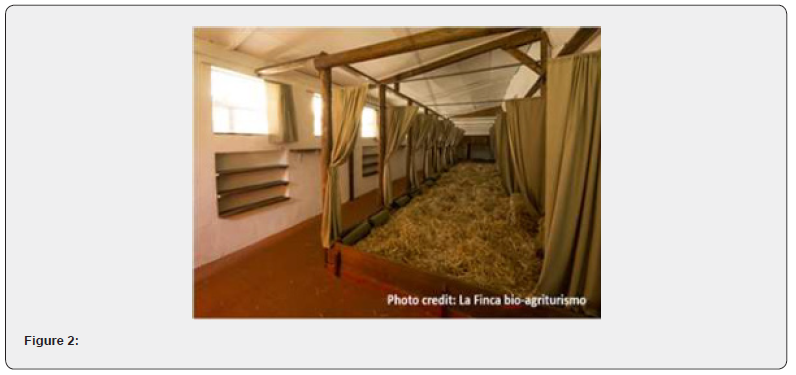Environmental Sciences & Natural Resources - Juniper Publishers
Abstract
Switzerland's tourism industry, while economically successful, faces challenges in environmental impact and visitor experience authenticity: this paper explores the potential of rural and agricultural tourism as a new avenue for sustainable and environmentally friendly growth. The idea is to propose a framework for developing low-impact, high-engagement experiences that connect tourists with nature, local culture, and agricultural practices. This approach fosters environmental responsibility, economic diversification in rural areas, and the creation of unique value for tourists seeking a deeper connection with Switzerland.
Keywords: Environmental impact; Sustainable tourism; Rural tourism; Nature; Agrotourism; Switzerland
Introduction
In an historical period where populations and civilizations are moving more and more into residential agglomerations, urban centers and metropolises the desire to "escape" from everyday life and the need of being reunited with the nature become a necessity, increasingly felt by a growing number of individuals [1]. At the same time, some consumers give priority to elements linked to low environmental impact, to sustainability, for respecting of nature and organic products rather than only the price or the easy availability of goods [2].
From these increasingly trends, new possibilities linked to agriculture and rural sectors are born with the research of a total immersion “in the green”. Alongside the institutional vacations that we all know, we can see some structures that allow - or that require - participation in agricultural life: in addition to a traditional approach related to holiday farms, horseback riding or bird watching we see new realities in which tourists can have an active role in the organization of rural life, being responsible for looking after farm animals or taking care of a vegetable garden or participating in the harvest [3].
But what do we mean when we talk about "agricultural tourism" and "rural tourism"? Without wishing to conduct a linguistic analysis in this study of the two terms, we could define them for convenience as the various forms of tourism directly connected to territorial resources and which find their main component in rural culture. Therefore, it is not just a matter of tourism towards rural areas, but of an original approach to low-impact tourism, which includes a fully use of a territory [4]. This certainly means allowing agriculture, in all its forms, to become the protagonist of a holiday from the recovery and enhancement of traditions to the consumption of typical products, from the visit of cultural and artistic heritages to active and experiential participation in rural life and activities. All by retracing ancestral values such as circularity, sharing and sustainability [5].
The Territory
Switzerland's tourism industry has long been a cornerstone of its economy, contributing significantly to GDP and employment [6]. However, the traditional model of mass tourism often comes at the expense of environmental degradation and cultural commodification [7]. In response to growing concerns about overtourism and climate change, there is a growing consensus that a more sustainable approach to tourism is needed. Switzerland, with its commitment to environmental conservation and high-quality tourism experiences, is ideally positioned to lead this transition towards sustainability [6].
Switzerland Tourism has defined 13 visitor types, according to their needs, with the purpose of having a better segmentation of the tourist demand and one of those is the so-called “Nature Lovers”, searching for gentle and authentic interaction with nature as a way of recharging their batteries [8]. Switzerland, with its central position in Europe and its diverse geography, has many natural resources to offer to visitors seeking sustainable tourism, who are attentive to the environmental and social impact of tourism activities but always looking for authentic and responsible experiences. In addition to that, many of the traditional tourism activities are already inherently sustainable, taking place outdoors and allowing you to appreciate the natural beauty of the region - the Confederation has one of the highest percentages of renewable energy in the world and is working towards climate neutrality by 2050 [9].
Methodology
This research adopts both descriptive as well as analytical approach for carrying out the research results. The will is to investigates the innovative approaches to sustainable tourism development in Switzerland analysing real cases of the territory to understand what is being done and what the future developments of the sector could be. Several field research, interviews and insights have been conducted not only for the realization of this poster but for a more structured series of articles based on how effectively agriculture and rural tourism can help in the development of a more sustainable tourism.
Results
Switzerland has a long tradition linked to organic agriculture and sustainable food products, such as cheese, wine, and chocolate and, according to our research, these are the elements to be exploited to create a new value proposition involving sustainable tourism [10]. The cheese is one of Switzerland's signature products and having the possibility of making this culinary delicacy in a dairy can be a unique and funny experience for tourists [11]. For example, several dairies open their doors to tourists, allowing them to see how cheese is made and to actively participate in the production process. During the visit, tourists can also actively participate in the production of products, getting hands-on and helping the dairies prepare the cheese. This can be a very entertaining, engaging and educational experience, as visitors can see the cheesemaking process up close and have a first-hand experience of the art and tradition of cheese making [12]. Do we consider the satisfaction of eating a homemade cheese made by yourselves? (Figure 1)

Another favourite practice of tourists traveling to Switzerland is sleeping on straw: this is a unique authentic experience in which tourists can try a form of traditional accommodation that may not be available elsewhere. This kind of ancestral experience allows visitors to immerse themselves in the local culture and learn about the traditions and practices of the area they are visiting. "Sleep in Straw" is a Swiss association which, among various activities, aims to promote this unique experience. On their website there are listed - at the date of publication of this article - 59 farms that offer overnight stays in straw beds (Figure 2).
The approach of various wine producers in the Mendrisio area - located in the southern part of Switzerland, in the canton of Ticino, near the border with Italy - is interesting, allowing tourists to have a unique experience, in close contact with nature, actively participating in the harvest. Several wineries welcome visitors and let them experience firsthand the magical festive atmosphere that traditionally accompanies harvest time by spending a day among the rows, picking bunches of ripe grapes, learning closely the first stages of winemaking. Enhancing the wine tourism experience leads to an enhancement in consumers' attitudes towards wine, their assessment of both extrinsic and intrinsic attributes, and their loyalty towards various wines. Moreover, segmenting consumers based on their level of wine tourism experience can assist wine marketers in comprehending their target audience and market direction [13].

Conclusion
Because of its history, its geography and its tradition, Switzerland has many opportunities to offer sustainable tourism thanks to its natural resources but, above all, thanks to a culture of sustainability that also passes through its agriculture and its sustainable food products. Switzerland can continue to be an ideal tourist destination for those seeking an authentic and sustainable experience but has to innovate new tourist proposition to be more captivating and contemporary like Regenerative Tourism (that aims to regenerate and restore the natural and cultural systems of local communities) or New Technologies (changing the tourism industry worldwide, including agriculture and rural tourism) with mobile apps and artificial intelligence that are leading to greater transparency, user engagement and personalized services for travellers.
By embracing this new approach, Switzerland can ensure the long-term viability of its tourism industry while preserving its pristine environment and unique cultural identity.
To Know More About International Journal of Environmental Sciences & Natural Resources Please click on:
For more Open Access Journals in Juniper Publishers please click on:





No comments:
Post a Comment